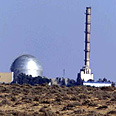
Israel's nuclear reactor in Dimona
Photo: Reuters
When Prime Minister Ariel Sharon recently spread out photographs of suspected Iranian nuclear sites during a lunch at U.S. President George Bush’s Crawford, Texas getaway he certainly wasn’t thinking of giving away Israel’s own ranch.
But after warning the U.S. administration that Iran was nearing "a point of no return" in learning how to develop a nuclear weapon, increased attention is being put on two new U.S. State Department comments that call on Israel to forswear nuclear weapons and accept International Atomic Energy Agency safeguards on all nuclear activities.
The State Department statements, just weeks ahead of the Nuclear Non-Proliferation Treaty's 35th anniversary and Israel’s own 57th birthday, highlight the Jewish state’s ongoing struggle to achieve a primary Zionist objective - normalcy.
Israel never acknowledged possession of nukes
They also came as the Israeli nuclear whistleblower, Mordecai Vanunu, went on trial for allegedly violating the terms of his release from prison. Vanunu was released after serving 18 years, nearly 12 of them in solitary confinement, for leaking details and pictures of the state’s alleged nuclear weapons facility in Dimona to a British newspaper.
Alleged, of course, because despite evidence that suggests it has up to 200 bombs, Israel has never acknowledged that it possesses nuclear weapons. In some ways, the Jewish state’s policy of "nuclear ambiguity" contradicts the Zionist goal of normalizing the Jewish people, providing them with a state and asking that they be treated like all other nations.
This has never been more true than today, with the United States having just led a war to disarm a nation accused of harboring weapons of mass destruction and members of the world community doubling efforts to halt rogue states’ acquisition of nuclear weaponry. Israel’s "strategic policy," however, means that it is not subject to controls of the Non-Proliferation Treaty, which it has not signed, or inspections by the International Atomic Energy Agency.
Those who charge that both the U.S. and Israel display an unfair double standard in demanding that Iran and others exercise transparency while exempting Israel have a point. As Avner Cohen, the author of Israel and the Bomb, wrote in Ha’aretz last year, Israel’s policy has "become a political burden on the U.S. and the international regime aimed at preventing nuclear proliferation. Since Israel remains outside that international regime, it makes it difficult for the need to strengthen the mechanisms preventing nuclear proliferation."
Chilling message on first bomb?
Even more chilling and perhaps more telling is the belief that the words "never again" are allegedly written on the first of Israel’s alleged bombs. This legend, and all it represents to a people traumatized by their history, underscores the resiliency of what has been called Israel’s last taboo as well as the state’s struggle to both act and be treated normally.
But let’s be fair. What were the chances that a nation born amid the annihilation of a third its own people, the partial uprooting of another and the overall hostility of its neighbors, including Tehran’s uranium happy mullahs, could reach complete normalcy in just over 50 years?
Moreover, the mantra of "never again" has not only affected Israel’s own development. The rise in anti-Zionist sentiment throughout Europe, as well as the region’s problematic response to acts of anti-Semitism, speaks to their own dysfunction vis-à-vis Israel.
Whatever Israel’s faults, too many Europeans seem to have relished the chance to finally take the Jewish victims to task for oppressing another people, the Palestinians. Israel’s unjust actions deserve to be criticized, but, at the same time, European states and their press have done a poor job at addressing their own role in today’s Mideast mess, which is born of both the destruction of European Jewry and the rule of mandatory Palestine and adjacent territories.
When viewed from this perspective, Israel may have still not have reached full normalcy (whatever that is), but it is certainly above par for its course - the Middle East, where 22 Arab governments continue to have far less regard for democracy and human rights.
But for Israel to more fully normalize it will at some point need to reassess its policy of nuclear ambiguity. When that time comes, one can only hope that the decision will help lead to a more equitable appraisal of Israel’s place in the world, in addition to a reduction in the efforts of Israel’s neighbors to acquire their own weapons of mass destruction.















